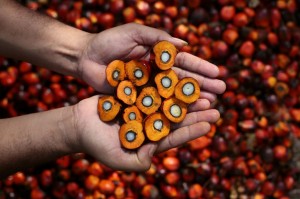 According to the latest data from the Roundtable on Sustainable Palm Oil (RSPO), sales of Certified Sustainable Palm Oil (CSPO) for the first quarter ending March 31, 2014, has hit a new high, with a 49% increase for physical uptake of RSPO CSPO and a 54% increase for GreenPalm Certificates, compared with Q1 2013.
According to the latest data from the Roundtable on Sustainable Palm Oil (RSPO), sales of Certified Sustainable Palm Oil (CSPO) for the first quarter ending March 31, 2014, has hit a new high, with a 49% increase for physical uptake of RSPO CSPO and a 54% increase for GreenPalm Certificates, compared with Q1 2013.
Sales of physical CSPO reported in RSPO’s eTrace system through Identity Preserved (IP), Segregated (SG) and Mass Balance (MB) supply chains have increased to 506,586 metric tonnes (MT) in the first quarter ending March 31, 2014, compared with 340,668 MT in the same period last year.
Meanwhile, GreenPalm Certificates clocked in sales of 853,338 MT for the first quarter of the year, up 54% from 555,906 MT in the same period last year. GreenPalm trading during the month of March has also resulted in a record of total premiums back to RSPO certified growers of US$6.6 million.
According to RSPO, many companies who committed to 100% RSPO Certified Sustainable Palm Oil (CSPO) supply came from large European Retailers and Consumer Goods Companies, especially those with a 2015 deadline.
The current estimated annual production capacity of RSPO-certified sustainable palm oil is 9.7 million metric tons, approximately 16% of global crude palm oil. Spread over 1.97 million hectares of certified production area, about 47.85% of the world’s current RSPO-certified sustainable palm oil production capacity comes from Indonesia, followed by 43.95% from Malaysia, and the remaining 8.2% from Papua New Guinea, Solomon Islands, Brazil, Thailand, Colombia, Cambodia and Ivory Coast.
An interesting information that I got during my attendance at the POC Palm and Lauric Oils conference in Kuala Lumpur in early March is that there already seems to be growing tension brewing between RSPO and local palm oil producers from Indonesia and Malaysia, the two biggest palm oil producing regions worldwide.
In 2009, the Indonesian Government launched its own Indonesian Sustainable Palm Oil (ISPO) standard, which is reportedly designed to ensure that all Indonesian oil palm growers, not just those exporting to foreign markets, conform to higher agricultural standards. Some analysts contend that RSPO, which is a non-government organization, seems to have more stringent requirements and guidance for its members when it comes to certification, while the ISPO certification, which is mandatory for palm growers in Indonesia, does not have as much comprehensive treatment of social issues and has vaguely worded requirements for compliance.
Malaysian palm growers have also recently created their own Malaysian Sustainable Palm Oil (MSPO) standard as like their counterpart in Indonesia, some of the local palm growers are unable to fulfill the RSPO’s stringent certification requirements, according to news reports. There are some reported accusations in the past that the RSPO now mostly caters to environmental groups instead of reaching out more to local palm growers.
One of these environmental watchdogs is the Union of Concerned Scientists, which recently posted its latest Palm Oil Scorecard that ranked some of America’s biggest brand owners on their commitment to deforestation-free palm oil in their supply chain.
Several brand owners such as General Mills, Cargill, Danisco, Hershey Company, Unilever, Procter & Gamble and many more have succumbed to the increasing pressure from stakeholders, consumers and environmental groups, while even chemical companies such as BASF, Elevance Renewable Sciences, Pilot Chemical, Stepan, Huntsman, AkzoNobel, Evonik, Solvay, etc., have also stated commitments to source sustainable palm oil for their supply chain.




